White Heat Blu-ray Movie
HomeWhite Heat Blu-ray Movie 
Warner Bros. | 1949 | 113 min | Not rated | May 21, 2013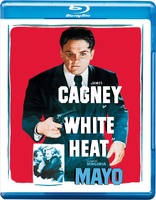
Movie rating
8.3 | / 10 |
Blu-ray rating
| Users | 0.0 | |
| Reviewer | 4.5 | |
| Overall | 4.5 |
Overview
White Heat (1949)
A government agent infiltrates a gang run by a mother-fixated psychotic.
Starring: James Cagney, Virginia Mayo, Edmond O'Brien, Margaret Wycherly, Steve Cochran (I)Director: Raoul Walsh
| Drama | Uncertain |
| Film-Noir | Uncertain |
| Crime | Uncertain |
| Thriller | Uncertain |
Specifications
Video
Video codec: MPEG-4 AVC
Video resolution: 1080p
Aspect ratio: 1.37:1
Original aspect ratio: 1.37:1
Audio
English: DTS-HD Master Audio Mono (48kHz, 24-bit)
German: Dolby Digital Mono
Spanish: Dolby Digital Mono (Spain)
Spanish: Dolby Digital Mono
Portuguese: Dolby Digital Mono
Subtitles
English SDH, French, German SDH, Portuguese, Spanish
Discs
50GB Blu-ray Disc
Single disc (1 BD)
Playback
Region free
Review
Rating summary
| Movie | 5.0 | |
| Video | 5.0 | |
| Audio | 4.0 | |
| Extras | 3.0 | |
| Overall | 4.5 |
White Heat Blu-ray Movie Review
Mother's Little Helper
Reviewed by Michael Reuben May 19, 2013Note: "White Heat" is available either separately or as part of the Warner Ultimate Gangsters Collection: Classics. After James Cagney's contract with Warner Bros. expired in the early Forties, he formed his own production company and swore he'd never make another gangster film. "Movies should be entertaining, not blood baths," the actor famously grumbled. "I'm sick of carrying a gun and beating up women." Unfortunately for Cagney, he did not prove adept at choosing his own projects. None of the films released by his company through United Artists proved successful. Bowing to the inevitable, Cagney returned to Warner Bros. in 1949 to great fanfare (and on extremely favorable terms to the star) for what is generally considered his greatest performance in the genre that both he and the studio had done so much to define. And what a performance! Reuniting with director Raoul Walsh, his director in The Roaring Twenties (1939) and Strawberry Blonde (1941), Cagney synthesized familiar elements from his numerous portrayals of vicious, amoral men—and then surpassed all of them in extreme behavior. Because he was a beloved movie star, Cagney knew that he would have the audience on his side. In creating the character of Cody Jarrett, the star and his director seemed to take an almost perverse glee in testing the limits of that sympathy, in seeing just how far viewers were willing to follow Cody in tolerating his psychotic, despicable behavior. Long before Tony Soprano became everyone's favorite killer with mommy issues, Cody Jarrett paved the way. Despite what many agreed was a career best performance, Cagney was not even nominated for an Oscar, probably because the AMPAS had yet to embrace the notion that great villains (or anti-heroes) could be award-worthy. Nor was Walsh's direction nominated, despite what is now acknowledged as a masterly control of pacing and camerawork. White Heat's only nomination was for its taut script, with a story by Virginia Kellogg and a screenplay by Ivan Goff and Ben Roberts (the latter pair would work again with Cagney on Man of a Thousand Faces in 1957). The writers' diverse source material included the true crimes of murderer Francis Crowley, who was executed at age 18, and the exploits of the infamous Barker gang of the Thirties, which consisted of "Ma" Barker and her sons. Many of the film's most striking scenes were developed spontaneously by Cagney and Walsh, in their determination to create a gangster film unlike anything ever seen before.

White Heat is bookended by two daring robberies perpetrated by a gang led by Cody Jarrett (Cagney), a grinning and remorseless killer of whom even his own followers are afraid. The film's opening depicts the brazen daylight robbery of the postal car on a California train, which is carrying government funds. During the course of the robbery, which Walsh shoots with the kind of logistic precision that is sadly missing from so many contemporary films, Cody casually executes anyone who might identify him. Then one of his own men, Zuckie (Ford Rainey), is badly wounded when a steam valve is accidentally triggered. When the time comes, Cody casually orders Zuckie's death, because taking him to a hospital would be too risky. With Treasury agents combing the area, Cody and his gang hide in a remote mountain shack, which gives us a chance to get to know the key players. Verna Jarrett (Viriginia Mayo), Cody's wife, has many of the qualities of a femme fatale. She's beautiful, sultry and duplicitous. She may have loved Cody at one time, but now she's just afraid of him. She also knows that the only woman whom Cody will ever truly care about is his Ma (Margaret Wycherly). Ma Jarrett travels with the perfect disguise: grandmotherly features that no one would suspect conceal a merciless and calculating criminal mind. Like her son, Ma trusts only blood relations, which means that she and Cody consider every other gang member expendable. Mock or disagree with one, and the other will punish you (as shown in an exchange where talking about strawberries the wrong way gets Verna shoved to the floor). Cody's chief lieutenant is "Big Ed" Somers (Steve Cochran), who thinks he's much smarter than he is and is always shooting knowing glances at Verna. She returns his interest, probably because she hopes he will get her away from Cody. (It doesn't hurt that he's handsome.) Cody, however, isn't fooled for an instant. "If I turned my back long enough for Big Ed to put a hole in it, there'd be a hole in it", he tells Verna. Law enforcement eventually catches up with the gang, and Cody is captured after injuring Treasury Agent Philip Evans (John Archer) in a shootout. But Cody has a contingency plan. He confesses to a much lesser crime committed by an associate in Illinois at the same time as the train robbery. He is sentenced to one to three years in state custody, but now has the perfect alibi for the much more serious federal offense. How could he have robbed the train in California when he was in Illinois at the time? The extended middle section of White Heat is essentially a prison film chronicling Cody's time in custody. Viewers who think they've seen it all on Tom Fontana's graphic prison series Oz should see White Heat, if only for the remarkable cafeteria scene shot with hundreds of extras, who weren't informed in advance what would be happening that day. They were simply told to react, and their stunned faces are the real thing. Frustrated by Cody's dodge, Agent Evans recruits an undercover specialist, Hank Fallon (Edmond O'Brien), to enter the prison as a convict named "Vic Pardo", share Cody's cell and try to get close to him—a tall order, given Cody's inherent suspicion of everyone. Fallon gets a break, however, when Verna and Big Ed recruit another inmate, Roy Parker (Paul Guilfoyle), to kill Cody and solve all their problems. Fallon narrowly averts an "accident" in the prison machine shop, which both starts a relationship and inspires Cody to escape. When he does, Fallon accompanies him. So does Parker, to his regret. "You wouldn't kill me in cold blood, would you?" whines Parker. "No", replies Cody, "I'll let you warm up a little." He's as good as his word. In the final act of White Heat, director Walsh orchestrates a multi-layered and rapidly accelerating narrative as Cody returns to California to resume control of his gang (and take revenge on Verna and Big Ed); Fallon continues to ingratiate himself so that he can learn the identity of the "Trader" (Fred Clark), Cody's fence and source of funding; Agent Evans and his law enforcement colleagues desperately try to keep tabs on Fallon with the era's limited technology; and unexpected danger arises in the form of a thug from Fallon's past, who will recognize him as a cop and blow his cover. The robbery that brings all these elements together involves the payroll of a massive oil and gas refinery in San Pedro, which Cody penetrates using an empty tanker as a Trojan horse. It's here that the movie reaches its famously explosive conclusion. As vivid a character as Cody Jarrett is, he defies easy explanation, which is undoubtedly one reason for his enduring appeal. His mother fixation is obvious, but there's no tenderness to it, even in the famous scene in which Cody climbs into his mother's lap. The relationship between Cody and Ma is more like that between soldiers who have seen war together and expect to see more. It's an understandable bond, since, as we learn during the film, Cody's father, Ma's husband, died in an insane asylum. Clearly the two of them have depended on each other for most of Cody's life. And what of Cody's crippling headaches that appear out of nowhere and seem to dissipate just as rapidly, although they render him helpless for as long as they last? They exhibit elements of both epilepsy and migraine, but they don't match the clinical profile of either. Agent Evans suggests that they're psychosomatic, but to what end? Are they perhaps the last remaining expression of the feelings that Cody has repressed in his determination to let nothing interfere with his criminal business? Or are they the physical manifestation of his fear that someday he will have to answer for his crimes? Cagney was not a method actor. He did not need to have such questions answered to play Cody Jarrett. He just knew how to take all of these traits and fuse them into a performance that would keep people fascinated, spooked and still guessing for years to come. In movie terms, that is the top of the world.
White Heat Blu-ray Movie, Video Quality 
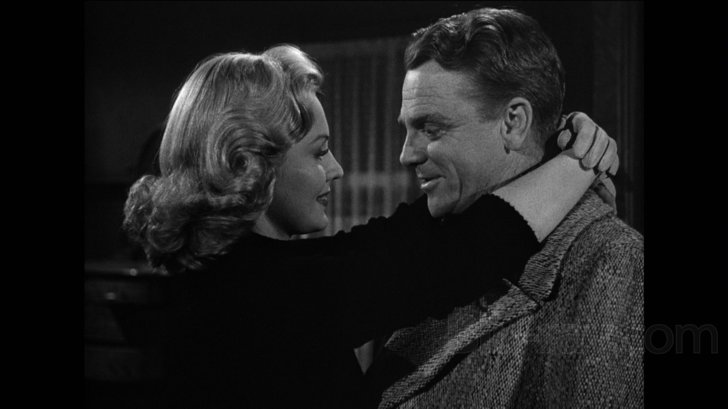
White Heat was shot by director Walsh's frequent collaborator Sidney Hickox, a highly regarded Warner cinematographer, who also shot To Have and Have Not and The Big Sleep for Howard Hawks. Hickox's gritty, realistic style is beautifully represented on Warner's 1080p, AVC-encoded picture, for which the source material is in pristine shape. The detail is exceptional, the blacks are deep and solid, the contrast is excellent and the finely delineated shades of gray give the image substance and depth. The film's grain pattern is fine and natural-looking, and Warner has used a BD-50 for this 113-minute film (the longest of the four included in the Ultimate Gangsters Collection: Classics box set), which allows for an average bitrate of 28.97 Mbps. This is a first-rate presentation of one of the glories of Warner's catalog.
White Heat Blu-ray Movie, Audio Quality 
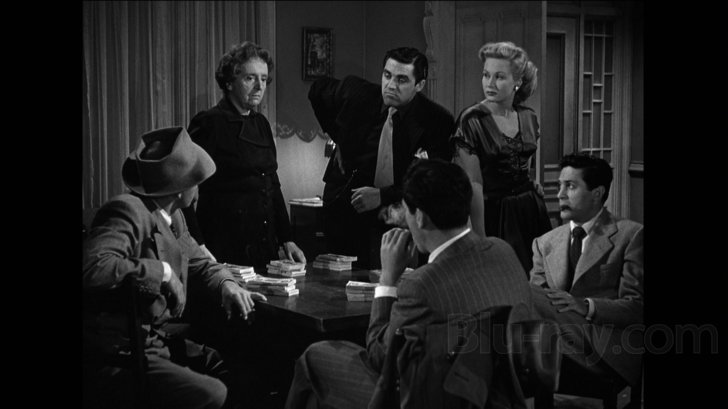
The film's original mono soundtrack is presented as lossless DTS-HD MA 1.0, and it's impressive. White Heat may only have one channel of sound, but the mix is elaborate, whether it's the noises of the train intermingling with the intrusion of Cody's gang in the opening sequence, or the stew of sound effects in the prison cafeteria scene, or the cacophony during the attempted payroll heist at the end of the film. Listen closely, and there are plenty of individual noises to pick out. The Blu-ray track's fidelity and dynamic range are good enough to let your ears be engaged by everything the engineers put there. Three-time Oscar winner Max Steiner wrote the intense score, which has an exploitation film vibe to it while somehow remaining classy. I'd love to hear it in full 5.1 surround, but it sounds quite good in this mono version.
White Heat Blu-ray Movie, Special Features and Extras 
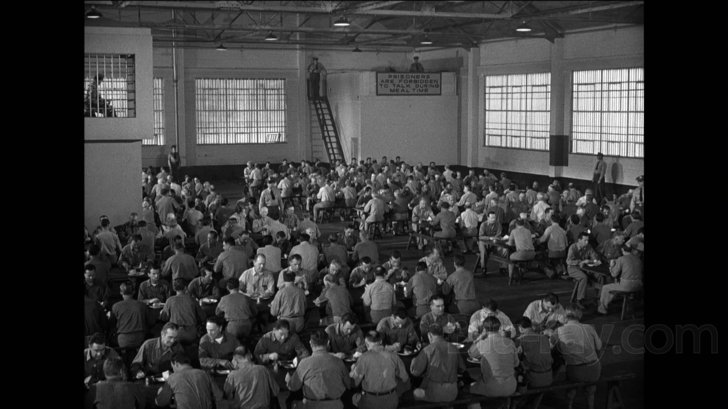
The extras have been ported over from Warner's 2005 DVD.
- Commentary with Dr. Drew Casper: A professor at the University of Southern California and author of Postwar Hollywood: 1946-1962, Casper is an enthusiastic commentator and a devoted fan of White Heat. In addition to background on Cagney's and Walsh's careers and the making of the film, he points out many aspects of the film's construction and Walsh's directorial technique.
- Warner Night at the Movies 1949
- Introduction by Leonard Maltin (480i; 1.33:1; 2:59): The well-known critic and film historian provides an introduction to the various items from 1949 (and later) listed below.
- "The Fountainhead" Theatrical Trailer (480i; 1.33:1; 2:19): The 1949 film starring Gary Cooper and Patricia Neal.
- Newsreel (480i; 1.33:1; 1:30): This excerpt focuses on Harry S. Truman's inauguration after his 1948 re-election.
- Short: "So You Think You're Not Guilty" (480i; 1.33:1; 10:31): Part of the "Joe McDoakes" comic short series (also known as "Behind the Eight Ball") starring George O'Hanlon, this one begins with a faulty traffic signal.
- Cartoon: "Homeless Hare" (480i; 1.33:1; ): A 1950 Chuck Jones-directed Merrie Melody.
- Short Feature: White Heat: Top of the World (480i; 1.33:1; 16:55): With participation by Martin Scorsese, Dr. Drew Casper, Robert Sklar, Dr. Lincoln D. Hurst of USC, author Mark Vieira and, in vintage interview footage, Virginia Mayo, this featurette provides an overview of the film and its place in Cagney's career.
- Theatrical Trailer (480i; 1.33:1; 2:25): "In the white hot glare of a relentless man-hunt is the shadow of the most terrifying figure the screen has ever known!"
White Heat Blu-ray Movie, Overall Score and Recommendation 
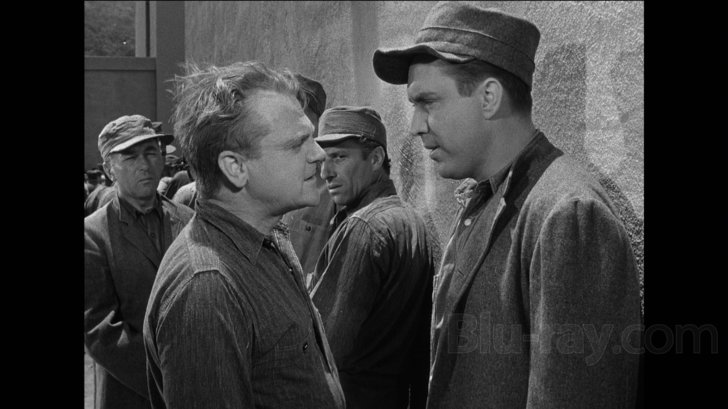
Most people know Cody Jarrett's famous last line—"Made it, Ma! Top of the world!"—but they've never sat and watched White Heat from start to finish. That's unfortunate. No screen actor has ever surpassed James Cagney's ability to combine menace with irresistible charm, or to convey danger with a simple glance that's impossible to resist. Stanley Kubrick once asked Steven Spielberg to name his top five favorite actors of all time, then gave the younger director a gentle ribbing when Cagney wasn't among them. Kubrick was right. Highly recommended.
Similar titles
Similar titles you might also like

Little Caesar
1931

The Public Enemy
1931

Crashout
Gunmen on the Loose
1955

The Petrified Forest
1936

High Sierra
1941

Angels with Dirty Faces
Warner Archive Collection
1938

House of Bamboo
Limited Edition to 3000 - SOLD OUT
1955

Leave Her to Heaven
1945

No Orchids for Miss Blandish
1948

They Live by Night
1948

Cry Danger
1951

Dark Passage
Warner Archive Collection
1947

The Price of Fear
1956

Blast of Silence
1.85:1 and 1.33:1 aspect ratio presentations
1961

Trapped
Deluxe Edition
1949

The Desperate Hours
1955

Force of Evil
4K Restoration
1948

Gun Crazy
1950

The Asphalt Jungle
1950

Storm Fear
1955